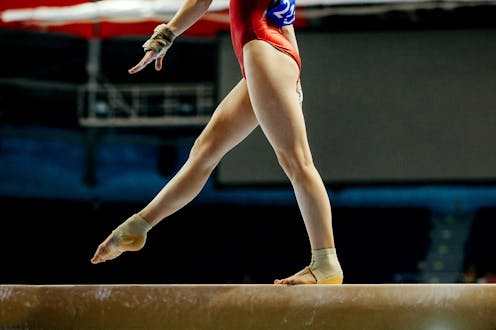Sport Integrity Australia's report represents a reckoning for West Australian gymnastics – but has justice really been done?
- Written by Georgia Cervin, Honorary Research Fellow, The University of Western Australia

Children forced to train on empty stomachs and falling on their heads. Young athletes told to manage the welfare of their own coaches. Girls starving themselves before enduring skinfold tests to avoid the horror of gaining weight, and sending them into lifelong patterns of disordered eating.
These are the stories that have emerged from a report[1] released this week on the women’s gymnastics program at the Western Australian Institute of Sport (WAIS).
Read more: As a former elite gymnast, I know sport needs a cultural shift to ensure athlete safety[2]
Calls from former gymnasts
When more than 50 former athletes[3] from the WAIS women’s artistic gymnastics program called for an investigation into their experiences, Sport Integrity Australia was brought in to conduct it.
Sport Integrity Australia is a government agency[4] established in 2020 with a mandate that includes investigating child abuse in sport.
The Sport Integrity Australia review follows the Australian Human Rights Commission’s report[5] nearly a year ago on the “toxic” and dehumanising culture of Australian gymnastics[6].
A trauma-informed approach
Adopting a trauma-informed approach, Sport Integrity Australia invited gymnasts to agree to the terms of the review alongside WAIS leadership.
This collaboration was an important first step in remedying the power imbalance between the gymnasts and WAIS that has marked many of their experiences.
The review was designed to map the trauma experienced in the WAIS program, examine potential policy failures and recommend ways to make the sport safer.
However, it was not set up to investigate individual claims or make disciplinary recommendations[7].
Ninety-two participants contributed, including former WAIS athletes, coaches and administrators.
Like the Australian Human Rights Commission’s report a year ago, the stories of those affected are peppered throughout the report – and they make for distressing reading.
Belitted, smacked, humiliated and ostracised
The gymnasts’ experiences are confronting.
Comments like “You’re a pawn in a bigger game,” “We were treated as objects,” and “I thought there was something so wrong with me” reveal the lack of care shown towards young people in a win at all costs culture.
They were yelled at, told they were pathetic, smacked for having a biscuit. For many, this report validates their concerns that these experiences were not OK.
Sport Integrity Australia recommended increased measures for athlete well-being, more child-focused programs, and that WAIS adopt Sport Integrity Australia’s independent complaints processes for child abuse investigations.
Ongoing effects of harm
Gymnasts reported the ongoing effects of their harm including eating disorders, emotionally abusive relationships and opiate addiction.
While the report doesn’t offer any chronology of experiences, it reviewed allegations of harm from 1987-2016 – the entire duration of the WAIS program’s existence. The most recent complaints were only six years ago.
“Times have changed and WAIS has changed with the times,” WAIS chair Neil McLean said in his response[8] to the report (following an apology “to those who experienced abuse and harm”).
In a statement released on Friday, he said Sport Integrity Australia “referred a number of allegations of sexual abuse and/or physical abuse to the relevant authorities who had the jurisdiction to investigate these allegation but none of these allegations progressed to investigation or charges and all have been closed.”
Gymnasts are now calling on[9] the WA government and Gymnastics Australia to take the lead and investigate further.
Gymnast Alliance Australia said[10], “child abuse has never been acceptable and should never be considered the ‘cultural norm’ of the time”.
Gymnasts lose agency
It’s at this point the review could be seen to depart from the trauma-informed approach it adopted at the outset. The recommendations deny gymnasts the agency and choice they were offered at the beginning of the process.
Without any explanation, the Sport Integrity Australia recommendations omit some of the remedies gymnasts were seeking, including redress and accountability for coaches who harmed them.
The report’s only recommendations for remedy are that WAIS should apologise, and that there be a “restorative and reconciliatory process” facilitated by an independent mediator.
Research shows that closure from traumatic events is not a “one size fits all” process[11].
Restorative and reconciliatory processes need to be designed around the needs of those affected.
Sports officials may be willing to do this, but without clear guidance from Sport Integrity Australia on how, they risk falling short.
So why no recommendations on disciplinary action?
Further context around Sport Integrity Australia’s mandate may provide some explanation.
Sport Integrity Australia was formed in July 2020 and in the safeguarding context, its task was to convince 93 sporting organisations[12] to sign up to its suite of policies known as the National Integrity Framework[13].
The National Integrity Framework provides for an independent complaints mechanism and a suite of policies to make sport safer.
Meanwhile, however, Sport Integrity Australia is also entrusted to investigate the same agencies it wants to sign up. Is this a case of conflicted loyalties?
Sport Integrity Australia may argue against this idea. Meanwhile, the question hangs over this and all similar reviews where Sport Integrity Australia is mandated to investigate a sporting organisation it needs to bring into its policy fold.
Read more: Girls no more: why elite gymnastics competition for women should start at 18[14]
References
- ^ report (www.sportintegrity.gov.au)
- ^ As a former elite gymnast, I know sport needs a cultural shift to ensure athlete safety (theconversation.com)
- ^ 50 former athletes (www.abc.net.au)
- ^ government agency (www.sportintegrity.gov.au)
- ^ Australian Human Rights Commission’s report (humanrights.gov.au)
- ^ culture of Australian gymnastics (theconversation.com)
- ^ or make disciplinary recommendations (www.brisbanetimes.com.au)
- ^ response (wais.org.au)
- ^ calling on (www.watoday.com.au)
- ^ said (twitter.com)
- ^ not a “one size fits all” process (classic.austlii.edu.au)
- ^ convince 93 sporting organisations (www.aph.gov.au)
- ^ National Integrity Framework (www.sportintegrity.gov.au)
- ^ Girls no more: why elite gymnastics competition for women should start at 18 (theconversation.com)

















